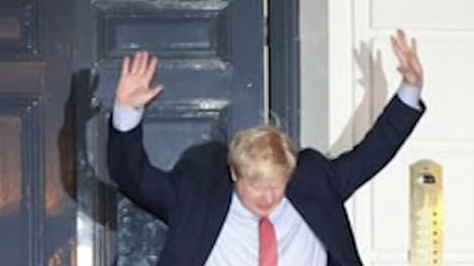Voters in the UK have handed the Conservative Party a decisive victory in the general election, which promises to bring certainty about Brexit and related issues that have clouded the British property investment and development landscape.
Boris Johnson is the prime minister, whose party comfortably achieved the majority needed to 'Get Brexit Done' by getting its withdrawal agreement through parliament, which will fire the starting gun on a raft of negotiations with the European Union (EU) on trade and much more.
For real estate investment in the UK, the result promises to unlock transactions which have stuck in limbo due to uncertainty about whether or not Brexit would take place. Certainty about the UK's relationship with the EU is set to stimulate further investment activity.
PropertyEU brings you all the reaction to the result as it comes from across the real estate investment sector in the UK and Europe, all in one place. Updates all day.
Try a PropertyEU subscription for free.
Knight Frank
Reacting to news of the result, Stephen Clifton, head of commercial at Knight Frank, said: 'Real estate decision makers have long craved greater political certainty, and this morning, that is the headline they have woken up to.
'We expect this clearer direction for UK politics to empower corporations to dust off expansion plans, developers to commission new schemes, and investors to home, and abroad, to quickly buy into what now looks like a very attractively priced real estate market. 2020 will therefore be a much more active year on all fronts, as the UK reconfirms its status as one of the world's few truly global real estate markets. '
Investec Structured Property Finance
But the resounding result fails to remove all uncertainty, cautions Will Scoular, co-head of origination at Investec Structured Property Finance.
'Brexit uncertainty has been an impediment to UK economic momentum since the referendum. A Conservative majority will likely relieve some of this as the UK Parliament then passes Mr Johnson's Brexit deal, allowing Brexit by January 31, 2020.
'Uncertainty will not be eliminated if the UK's persistent trading relationship is persistent. Still the removal of some of the Brexit fog should help lift business investment, UK growth and housing activity too.'
JLL
Meanwhile, Guy Grainger, EMEA CEO at JLL, pointed out the new Conservative government is far behind property investors on green issues, such as tackling carbon emissions.
'The Conservatives made lots of ambitious promises about Brexit, the NHS and Infrastructure, but their target of Net Zero Carbon by 2050 is the least ambitious manifesto, with no firm commitment on many decarbonisation issues,' he said.
'Forty percent of carbon emissions come from the built environment, the real estate industry needs to take responsibility in fighting the climate crisis.'
Legal view
Property investors will be glad that Labour's high tax plans failed at the ballot box, according to Bruce Dear, head of London real estate at global law firm Eversheds Sutherland.
'Real estate markets adore lower-tax and light regulation countries. So most property players will be delighted that Boris Johnson's Brexit bulldozer has crushed Corbynism under its own Red Wall,' he said.
'Labour has learned that history is a brutal teacher. Big election victories always bring short-term boosts. So expect a surge in investment and house prices. Turning that bounce into a tree will be a much bigger challenge.
'International property investors will relieved that Labor's high-tax and redistributive plans have been rejected by the electorate. But they won't rush into the UK yet. Their time will come next year. They will be hoping for mis-pricing and currency-driven opportunities as Prime Minister Johnson rams through his hard and high-speed Brexit.'
Retail
The resounding election result is not a recovery for the retail sector, according to Berkeley Research Group (BRG).
Ian Mackie, managing director, said: 'The deep-rooted issues for bricks and mortar retailers are set to continue as investors and valuers alike continue to provide a gloomy outlook for this sector, as emphasized by the difficulties experienced this week by the retail heavy M&G Property Portfolio Fund.
'With little prospect or positive immediate change in either Business Rates for major retailers or a slowdown in CVAs in this sector, we expect vacancy rates to continue their current trend, with continued over supply in this market.
'However, the outlook for other commercial property sectors, particularly prime office and logistics assets, remains more positive, and we expect to see investment volumes increase after the election.'
Brexit bounce?
The decisive result is likely to have tangible effects upon the investment sector quickly, said Guy Harrington, CEO or property lender, Glenhawk.
'Finally some light at the end of the Brexit tunnel. This result, coupled with finally leaving the EU in January, is the tonic the real estate market's leg waiting for. Expect improved liquidity, greater transaction volumes, a stronger pound and a bounce in the housing market, all of which will benefit lenders, investors and developers alike,' he said.
British Property Federation
The real estate sector can help tackle pressing issues, such as housing supply shortages and reducing carbon emissions, according to the British Property Federation.
Melanie Leech CBE, chief executive, said: 'We look forward to building a meaningful partnership with the new Conservative Government to help the property industry to maintain and increase the positive economic and social impact it makes across the UK.
'Our country faces huge challenges that the property industry is uniquely placed to help tackle, be it delivering more homes and better places, supporting our town centers, spreading prosperity through our regions or creating a clear roadmap to creating a net-zero built environment.
'We hope the Prime Minister will listen and grasp the opportunity with both hands.'
Royal Institute of Charted Surveyors
The Royal Institute of Charted Surveyors (RICS) called on the new government to focus upon high street and town centre renewal, among other priorities.
Hew Edgar, RICS Head of UK government relations and city strategy, commented: ‘We congratulate Mr Johnson on his election win; and hope that his Government provides the stability the UK’s built environment craves, as well as the attention it needs and deserves. For too long, domestic issues have been side-lined by the Brexit debate, and this has negatively impacted investment and growth in land, property and construction.
‘It is imperative that key issues, such as housing supply, high street and town centre renewal and climate change are a top priority for this Government. RICS will work with the new administration to ensure that these issues are tackled, in consideration of the social and environmental impact that any policy or legislation might have.’
More volatility coming?
Hermes Investment Management predicts 'getting Brexit done' could trigger more volatility in the pound and UK assets.
Silvia Dall’Angelo, senior economist, said: ‘The implementation (of Brexit) is far from straightforward. Once the EU withdrawal agreement is approved – which is now almost certain to happen by the end of January – the uncertainty about the end point of the journey will linger and the path to it will likely be bumpy and lengthy. Crucially, the UK will have to rebuild its network of trade arrangements, which is unlikely to be frictionless.
‘The removal of the uncertainty about the divorce aspect of the Brexit process is good news for the short-term economic outlook. Growth has slowed down significantly over the last few years, largely reflecting the drag from Brexit-related uncertainty on business investment.
‘However, as a new sequence of deadlines concerning the negotiation of a trade deal with the EU looms, uncertainty will probably re-emerge over the course of next year, which will probably be accompanied by renewed volatility in the pound and UK assets.
‘Indeed, according to the deal under discussion the transition period will end at the end of 2020 and any extension will need to be agreed by July, which will potentially create new cliff-edge effects. Moreover, there is no clarity about the trading arrangements that will eventually emerge between the UK and the rest of the world, which clouds the UK medium to long-term outlook.’
'Uncertainty could return quickly'
Zachary Gauge, European real estate analyst at UBS-AM real estate and private markets, said sunny forecasts could be shortlived, should the route to a post-Brexit trade deal with the EU be bumpy.
He said: ‘This may provide a short-term bounce, particularly in central London which appears attractively priced compared to other European markets. But the clock will start ticking very quickly towards end-2020 when the transition period comes to an end, and based on the experience of the previous three and a half years it's very difficult to see how all the details of the future trading arrangements can be tied up within 11 months.
‘So it may not be long until uncertainty returns to dampen the market. Economic growth is also expected to be subdued as businesses will still lack the clarity which is required to make long-term investment decisions in the UK until all those finer details are tied up.’



































